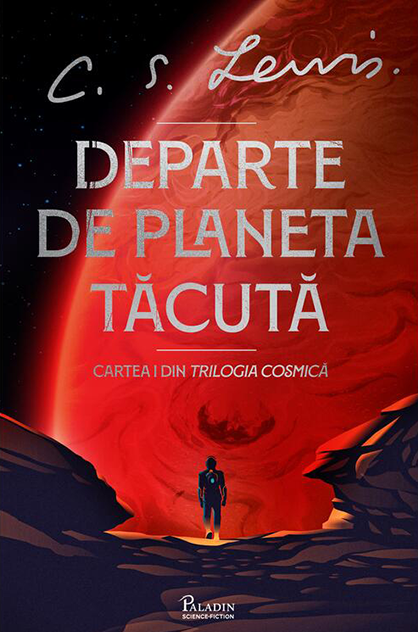- Rating: ★★★☆☆
- Editura: Art, imprint Paladin Science-Fiction
- Traducere: Andrei Dîrlău
- Pagini: 208
- Goodreads: Departe de planeta tăcută
- Poate fi cumpărată de aici: https://www.editura-arthur.ro/info/carte/departe-de-planeta-tacuta
„Departe de planeta tăcută” de C.S. Lewis este un roman SF cu idei interesante, însă am avut o relație amestecată cu lectura. Povestea începe într-un mod promițător, cu răpirea profesorului Ransom de către un fizician megaloman și complicele său, care îl duc pe Malacandra (Marte), o planetă necunoscută. Cei doi aveau intenția să jefuiască planeta și să ofere un sacrificiu uman, iar Ransom părea să fie alegerea perfectă pentru planul lor diabolic. Dar odată ajuns pe Malacandra, Ransom reușește să scape și descoperă o civilizație cu totul diferită, întâlnind trei specii inteligente care îi vor schimba complet perspectiva asupra universului și a Pământului.
Unul dintre momentele care mi-a rămas în minte a fost când Ransom începe să se simtă copleșit de infinitatea universului. Gândul la populația adevărată a cosmosului, la dimensiunile sale tridimensionale fără sfârșit și la eonii ce nu au fost consemnați în nicio cronică l-au amețit, iar această descriere a reușit să redea sentimentul de nesfârșit într-un mod foarte puternic. Totuși, pe măsură ce am avansat cu lectura, am simțit că aceste reflecții filosofice, deși captivante uneori, îmi îngreunează apropierea emoțională de poveste și de personaje.
Un alt aspect fascinant a fost momentul în care Ransom descoperă că Pământul este cunoscut în tot universul drept „planeta tăcută”, cu o poveste tragică, uitată de restul civilizațiilor. Această revelație adaugă un strat simbolic și profund, dar în același timp mă face să mă întreb dacă tema religioasă și morală introdusă de C.S. Lewis nu este uneori prea insistentă. Pentru un cititor care caută o poveste SF mai dinamică și mai axată pe acțiune, aceste momente de filosofie pot părea forțate.
Totodată, modul în care Lewis descrie planetele ca niște goluri în cerul viu, pustiuri de materie și aer excluse, mi-a oferit o imagine puternică și un sentiment de neliniște cosmică. Ransom ajunge să se întrebe dacă strălucirea universului se sfârșește odată cu sistemul solar și dacă dincolo se află adevăratul vid, adevărata moarte. Aceasta este o idee cu greutate, care rămâne cu tine după ce ai terminat cartea, însă cred că romanul se bazează prea mult pe astfel de meditații, ceea ce încetinește ritmul și scade intensitatea poveștii.
În concluzie, „Departe de planeta tăcută” are momente de adevărată strălucire și ridică întrebări interesante despre locul omului în univers, dar nu m-a captivat pe deplin. Ritmul lent și combinația de aventură și reflecție filosofică m-au făcut să simt că lipsește ceva pentru a mă lega cu adevărat de poveste. Cu toate acestea, este o carte care merită citită dacă ești deschis la o abordare mai profundă și spirituală a genului SF, dar pentru mine nu a reușit să atingă acel nivel de entuziasm pe care îl caut într-un roman.
Cartea a fost citită pentru clubul de carte Paladin.


Out of the Silent Planet – C.S. Lewis (The Space Trilogy #1)
Out of the Silent Planet by C.S. Lewis is a science fiction novel with intriguing ideas, but my experience with it was mixed. The story begins promisingly with the kidnapping of Professor Ransom by a megalomaniacal physicist and his accomplice, who take him to Malacandra (Mars), an unknown planet. Their intention was to plunder the planet and offer a human sacrifice, with Ransom seemingly the perfect choice for their diabolical plan. However, once on Malacandra, Ransom manages to escape and discovers a completely different civilization, encountering three intelligent species that profoundly change his perspective on the universe and Earth.
One moment that stayed with me was when Ransom begins to feel overwhelmed by the vastness of the universe. The thought of the true population of the cosmos, its endless three-dimensional expanse, and the aeons unrecorded in any chronicle left him dizzy. This description managed to evoke the feeling of infinity in a very powerful way. However, as I progressed through the book, I felt that these philosophical reflections, though captivating at times, made it harder for me to emotionally connect with the story and the characters.
Another fascinating aspect was when Ransom discovers that Earth is known throughout the universe as “the silent planet,” with a tragic story forgotten by the rest of the civilizations. This revelation adds a symbolic and profound layer, but at the same time, it makes me wonder if the religious and moral themes introduced by C.S. Lewis are sometimes too heavy-handed. For a reader seeking a more dynamic and action-driven sci-fi story, these philosophical moments might feel forced.
Additionally, Lewis’s description of planets as voids in the living heavens, deserts of matter and excluded air, gave me a vivid image and a sense of cosmic unease. Ransom begins to question whether the brilliance of the universe ends with the solar system and whether true void, true death, lies beyond. This is a weighty idea that lingers with you after finishing the book, but I think the novel relies too much on such meditations, which slows the pace and reduces the intensity of the narrative.
In conclusion, Out of the Silent Planet has moments of true brilliance and raises interesting questions about humanity’s place in the universe, but it didn’t fully captivate me. The slow pace and the mix of adventure and philosophical reflection made me feel that something was missing to truly connect me to the story. Nonetheless, it’s a book worth reading if you’re open to a deeper, more spiritual approach to the sci-fi genre, but for me, it didn’t quite reach the level of excitement I seek in a novel.
The book was read for the Paladin book club.

